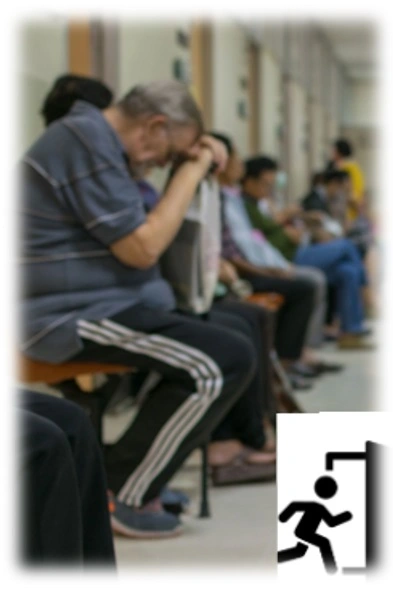Discover the importance of mental health urgent care for timely intervention. Learn how quick access to care can prevent crises and improve well-being.
Introduction
Why do more people neglect mental health care and are more concerned about physical health? It’s a global phenomenon that people care about physical health more than their mental health. However, the latter has far more importance in maintaining a balanced life. Mental health affects our thinking capacity, feelings and actions. It profoundly influences our daily lives, affecting everything from relationships to work performance. In today’s emotionally strained societies, stress, anxiety, and other emotional issues are prevalent. In such scenario, prioritizing mental health care has become essential. Left untreated, these conditions can have serious consequences. Therefore, urgent care is indispensable for treating mental health issues. Mental Health Urgent Care (MHUC) is an essential model to fill the gap between Emergency Rooms (ER) and traditional mental health services. This article will provide valuable insights into the importance, effective implementation and accessibility of MHUC.
What is Mental Health Urgent Care (MHUC)?
Urgent care treatment is completely different from ER treatment. The former intensively manages psychological issues while the latter typically focuses on life-threatening physical conditions.
Under MHUC, the care provider systematically examined and stabilize the patient. Afterward, the practitioner provides short-term interventions and refers to long-term care treatment according to the condition.

1. The growing need for Urgent Mental Health Services
The prevalence of mental health issues has increased in recent decades. As per National Institute of Mental Health (NIMH) data, every 5th adult in the United States of America is experiencing mental health issues yearly 3. But most people do not care about it until the situation worsens. Research has shown that less than 50 percent of people with mental illness receive the treatment they need. After COVID-19, the mental health issues further exacerbated, leading to an increase in depression, anxiety, and related issues.
2. Factors contributing to a lack of timely mental health care
There are three main factors that contribute to addressing the mental health issues timely:
Stigma: Individuals with mental health issues often feel stigmatized and reluctant to seek help until the circumstances get worse. In this connection.
Limited access: Accessibility is a common problem, particularly in rural or underserved communities where mental health professionals are barely available.
- High demand and proper schedule: Mental health professionals are not easily available, which is quite demanding. Even if they are available, the scheduled appointment and waiting times can be long enough. Therefore, that is also a challenging barrier.
To fill in the gap between demand for mental health services and their availability, urgent care for addressing mental health issues is deemed necessary to provide prompt services to those in need of urgent treatment.
3. Reasons why UMHC is necessary
The four major reasons why UMHC is essential:
- Preventing Crises Escalation:
Prompt action against mental health crises like acute stress, anxiety, depression, suicidal ideation, or serious panic attacks can prevent more threatening consequences. - Relieving ER burdens:
MHUC has a positive role in not overburdening the ER of physical health services. Directing individuals with mental health issues to MHUC has three advantages: the individual who reaches out to the concerned center for proper treatment, the ER, where staff may not be equipped to address mental health conditions, and the MHUC center, equipped with specialized staff handling acute conditions of the individual. - Reducing the need for inpatient care:
Keeping in view the need for inpatient intensive and psychiatric care, the MHUC center can play a vital role in providing early intervention to stabilize mental health sufferers in an outpatient setting while keeping them out of hospitals. Such practice will lower the healthcare costs and will also preserve the hospital resources. - Improving access to care:
While accessibility is a major hurdle for addressing the mental health issue timely, MHUC centers can make the walk-in clinic operational, improving access to care, particularly for those unable to schedule appointments. Telehealth is one of the dedicated MHUC centers that increases accessibility to care and convenience.
4. What type of services does the MHUC center offer?
The MHUC centers offer various services according to location, but there are some common services an MHUC center can offer:
- Immediate response during crisis:
The NIMH in the United States of America provides immediate response by providing emergency call services (911). In case of any suicide or crisis lifeline, someone near to the victim can text 988 to connect with 98 Suicide & Crisis Lifeline.



- Initial assessment and diagnosis:
The MHUC-qualified professionals, who may be psychiatrists, psychologists, or clinical social workers (licensed), make an initial assessment of individuals and note the symptoms. Afterward, a risk assessment is conducted and finally determines the course of action considered appropriate.
- Stabilization:
Here a systematic process is involved; the professional helps the individual calm him/her down, regulate emotions, and develop strategies to cope with the circumstances. For this purpose, the professional can use several techniques like Cognitive-Behavioral Therapy (CBT), mindfulness, or brief motivational interviewing. - Medication:
In case of acute symptoms like anxiety, depression, or psychosis, the professionals can prescribe medications for instant relief. However, if the individual is already taking psychotropic drugs, then medication regimens is advised to be properly managed. - Counseling:
Immediate access to counseling services and therapeutic support helps the individual to gain some perspective on their situation. - Referrals to ongoing care:
The MHUC center once desensitizes the acute condition, referring to the patient to long-term therapy, counseling, or psychiatric care.
5. Challenges
Despite the wide range of services MHUC centers provide the community, facing some challenges:
- Limited availability:
In recent years, an increase in the establishment of MHUC centers worldwide has been noted but is still not fulfilling the desired goals. - Skilled staff deficient:
A well-trained staff of MHUC is needed nationwide to meet demand. - Financial constraints:
Many of the MHUC center’s budgetary positions are very alarming, particularly in public health systems. Adequate funding can help strengthen its capacity. - Integration with large health services:
The MHUC may be integrated into a broader healthcare system (hospitals, etc.) for sustainability.
6. Conclusion
By focusing on prompt and compassionate care for those in distress, mental health urgent care services can help prevent the escalation of mental health crises, reduce emergency room congestion, and ensure that individuals get the care they need when they need it most.
